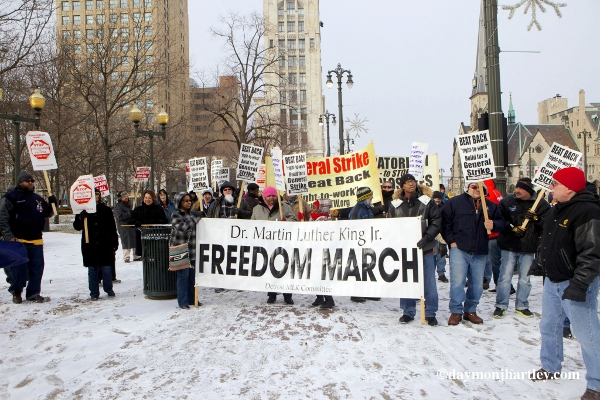
“Almost one hundred and one years ago, on September the 22nd, 1862, to be exact, a great and noble American, Abraham Lincoln, signed an executive order, which was to take effect in January the first, 1863. The executive order was called the Emancipation Proclamation and it served to free the Negro from the bondage of physical slavery. But one hundred years later, the Negro of the United States of America still isn’t free.” —Martin Luther King Jr.’s speech at the Great March In Detroit.
“Free by 63” was the battle cry of the 200,000 Detroiters that protested the old system of segregation on June 23, 1963.
June 23, 2013 is the fiftieth anniversary of Detroit’s historic Civil Rights march, where Dr. King delivered his “I Have A Dream” speech. King’s legendary sermon would be delivered during the August 1963 “March On Washington.”
In 1963, President Kennedy promised new Civil Rights legislation; the CIA (Central Intelligence Agency) would establish its domestic operations division; Malcolm X would deliver his famous “Message to the Grass Roots” and the year would end with the assassination of President John F. Kennedy.
With the laws of segregation still intact, Detroit was like an open air prison for Blacks. Without open occupancy laws, local block clubs and community associations restricted who could move into their neighborhood. Thousands of Blacks could not find housing and were crowded into isolated slums.
In 1963, the Big 3 (General Motors, Ford and Chrysler) were just starting to hire from the low point of the 1958 recession. It would take the Detroit march and “March On Washington” to change this policy.
The Black community was angry and in revolt over the police murder of Cynthia Scott. Officer Spicer shot her three times in the back and was never brought to trial. Cynthia, a prostitute, was shot in the back walking away from Spicer.
The Civil Rights Movement did accomplish its goal; desegregation. After the Detroit march and then Washington a series of laws were passed including the Civil Rights Act of 1964, the Voters Rights Act of 1965, fair Housing Act and sweeping laws, law suits and ordinances effectively destroyed legal segregation.
The Dream 50 years later
The introduction of new means of production—computers and robotics—changed America. One way or another, new means of production creates new classes, tearing society from its foundation, leaving unemployment, poverty and destitution in its wake. The new American proletarian class created by robots: the so-called “throw-away worker,” the temporary, the part-time, the under minimum wage, the permanently unemployed and the permanently poor, are increasingly outside capitalist society. The homeless, the destitute are at the core of this new class.
The dream Dr. King spoke of can only be realized in a society organized based on public, not corporate property or the principle of one for all and all for one, rather than the protection of the one percent.
